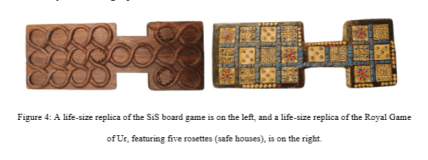Artificial intelligence will teach humanity to play ancient games.
Artificial intelligence not only searches for answers to the questions of hundreds of users, but also serves as an assistant in reviving ancient traditions. In particular, it helps uncover which board games people played thousands of years ago.
New Scientist notes that artificial intelligence is aiding in the restoration of long-lost game rules. These rules are not definitive but rather probable, based on similar games. Among the games mentioned is Shahr-i Sokhta, also known as the Ancient Burnt City Game. This board game was discovered in the 1970s in grave No. 731 in Shahr-e Sukhteh, located in Iran. It is approximately 4600-4700 years old and is considered the oldest complete board game ever found.
The game consists of 27 pieces and is played on a board with 20 squares. This is the earliest known example of a complete game with 20 squares. It stands out among more than 100 types of ancient strategy games found in the Middle East, played across various cultures rather than within a single civilization. For the first time, the game board has been reconstructed, and ancient rules that were likely used during that era have been added quite recently. The research paper was authored by Sam Jelveh from the School of Computer Science and Electronic Engineering at the University of Essex and Dr. Hossein Moradi.

The game bears a certain resemblance to the Royal Game of Ur from ancient Mesopotamia, whose long-lost rules were deciphered in 2007 from cuneiform inscriptions at the British Museum. To put the rules simply, players take turns rolling a set number of dice. One piece is moved according to the number rolled. If a piece lands on an opponent's piece, that piece is captured and sent back to the starting position. Some areas may be "safe," where pieces cannot be captured. Now, other ancient "board games" are awaiting discovery — the Roman game Ludus Latrunculorum and the Egyptian game Senet.
Previously, "The Telegraph" reported that artificial intelligence created digital replicas of people who survived World War II. They can be interacted with at a special exhibition in the USA.